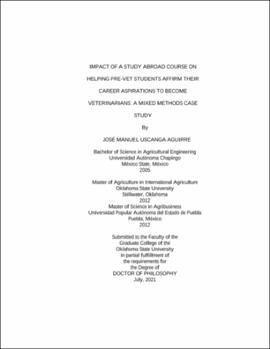| dc.contributor.advisor | Edwards, M. Craig | |
| dc.contributor.author | Uscanga Aguirre, Jose Manuel | |
| dc.date.accessioned | 2022-01-21T19:20:03Z | |
| dc.date.available | 2022-01-21T19:20:03Z | |
| dc.date.issued | 2021-07 | |
| dc.identifier.uri | https://hdl.handle.net/11244/333781 | |
| dc.description.abstract | This mixed methods, embedded case study sought to explore, understand, and interpret the impact of a study abroad course on pre-vet students' aspirations to become veterinarians. The study also strove to describe their views on the influence of local culture and the practice of veterinary medicine in Mexico. Several research procedures complemented the study as operationalized in three phases: qualitative, quantitative, and qualitative. Twenty-five students participated in a study abroad course tailored to veterinary medicine during the summer of 2019 and were the source of data. To answer the study's three research questions, the first research phase used textual content analysis, phenomenological, and photovoice procedures to distill students' perceptions from their written and photo journals. A retrospective evaluation was used for the study's quantitative phase. And timeline interviews guided the final phase of data collection to better understand the students' aspirations of remaining in or exiting the pre-vet option. Students perceived that veterinary medicine in Mexico was structured differently from the U.S. approach and the nation's socioeconomic and agroclimatology conditions impacted the delivery of veterinary care and affected the work settings and practice of veterinarians. They also perceived that socio-cultural views about the purpose of animals were significantly different compared to the United States, and veterinary medicine and animal welfare in Mexico were practiced in accord with such. The course contributed to enhancing students' understanding of application requirements to schools of veterinary medicine, practice options, and professional expectations of a DVM. Overall and in concert with the proposition of human capital theory, the course helped some students confirm their career aspirations and others realize that veterinary medicine was not the best career fit for them. Students' interactions with the learning environment, i.e., the study abroad experience, influenced their career aspirations, as postulated by interest-based motivation theory and person-environment fit theory. Recommendations are offered for practice and additional research, e.g., institutions should create or facilitate appropriate and timely learning opportunities for students to fully understand and confirm their interests in the veterinary profession while undergraduates; and other investigations should also seek to determine factors likely to influence pre-vet students' career choices. | |
| dc.format | application/pdf | |
| dc.language | en_US | |
| dc.rights | Copyright is held by the author who has granted the Oklahoma State University Library the non-exclusive right to share this material in its institutional repository. Contact Digital Library Services at lib-dls@okstate.edu or 405-744-9161 for the permission policy on the use, reproduction or distribution of this material. | |
| dc.title | Impact of a study abroad course on helping pre-vet students affirm their career aspirations to become veterinarians: A mixed methods case study | |
| dc.contributor.committeeMember | Robinson, J. Shane | |
| dc.contributor.committeeMember | Terry, Robert, Jr. | |
| dc.contributor.committeeMember | DeSilva, Udaya | |
| osu.filename | Uscanga_okstate_0664D_17366.pdf | |
| osu.accesstype | Open Access | |
| dc.type.genre | Dissertation | |
| dc.type.material | Text | |
| dc.subject.keywords | career aspiration and motivation | |
| dc.subject.keywords | culture | |
| dc.subject.keywords | high impact learning experience | |
| dc.subject.keywords | mexico | |
| dc.subject.keywords | pre-vet students | |
| dc.subject.keywords | study abroad course | |
| thesis.degree.discipline | Agricultural Education | |
| thesis.degree.grantor | Oklahoma State University | |
